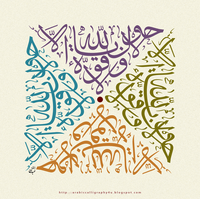
The Ḥawla (Arabic: حَوْلَة) or the LaHawla (Arabic: لَا حَوْلَ) is an Arabic term referring to the Arabic statement لَا حَوْلَ وَلَا قُوَّةَ إِلَّا بِٱللَّٰهِ (lā ḥawla wa lā quwwata illā billāh), which is usually translated as "There is no power nor strength except by God."
This expression is used by Muslims when seized by a calamity or in a situation beyond their control, usually when being oppressed or forcefully put through suffering. An equivalent English expression would be "oh my God". The word Ḥawqala is a portmanteau (or naḥt) of the words ḥawla and quwwata.
A longer version is لَا حَوْلَ وَلَا قُوَّةَ إِلَّا بِٱللَّٰهِ ٱلْعَلِيِّ ٱلْعَظِيمِ (lā ḥawla welā quwwata illā billāhil- aliyyi l-aẓīm), meaning "There is no power nor strength except by God (Allah) help and assistance".
See also
References
- Piamenta, Moshe (1979). Islam in Everyday Arabic Speech. BRILL. p. 155. ISBN 90-04-05967-9.
External links